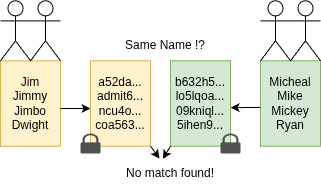# Hash-tag Baby: A Unique Solution to Avoid Duplicate Baby Names
Naming a baby can be a challenging task for expectant parents. Aligning on a name that both parties like is crucial, but keeping it a secret until birth can be tricky. If you're lucky enough to have close friends or colleagues who are also expecting, sharing experiences can be a unique opportunity. However, wouldn't it be disappointing if your friend's name turned out to be similar to yours?
In the realm of data science, Universally Unique Identifiers (UUIDs) can help solve this problem. Using UUIDs would guarantee uniqueness, but they might not be suitable for naming a child. So, what about more conventional names? If you've already chosen a name, there's a risk it might clash with your friend's choice.
To avoid similarities, you could start by comparing the initial letter or the total number of letters in each name. However, these methods can give away hints and might overlook slightly similar names or variations. It's like trying to find a needle in a haystack!
This is where hashing comes into play. Powerful algorithms like MD5 and SHA256 convert your baby name into unique text that seems like complete nonsense. Think of it as taking a person's fingerprint – uniquely identifying them, but without revealing any personal information.
In R, you can easily perform this conversion using the following code: ``` # Convert baby names to hashes name1 <- "Emily" name2 <- "Eleanor"
hash1 <- hash(name1) hash2 <- hash(name2)
print(hash1) print(hash2) ``` By sharing these "fingerprints" with your friends, you can compare if they clash without revealing any information about the original names. However, there is one loophole: your friends might try every possible name until they find a match, wasting time and karma points in the process.
Fortunately, hashing provides an easy and secure solution to this problem. It's commonly used for password storage, where only an encrypted version is stored, allowing for secure verification without revealing the actual password.
In case of data leaks, only the encrypted version is leaked, minimizing harm. However, hackers still have large "fingerprint databases" matching passwords with their hashed forms. To avoid this, use non-predictable passwords!
Now that we've covered the technical aspects, let's get started comparing baby names! The app is built using R Shiny and can be deployed for free using GitHub Pages. If you need a more advanced open-source solution, consider taking a look at ShinyProxy.
To create your own baby name comparer, follow these steps:
1. Install R Shiny and Shinylive. 2. Build the app using shinylive. 3. Host it on GitHub Pages for free. 4. Share the link with your friends and start comparing names!
Enjoy encrypting and comparing your baby names!
